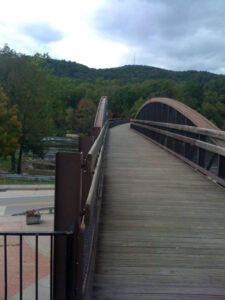Make Time for Growth (Friday Quote)
 I wrote this post a few days in advance, because today I am no where near a computer. I’m on day 2 of a four-day bike ride from Pittsburgh, PA to Gaithersburg, MD. It’s the 11th time I’ve done this ride. Day 2 is particularly nice, because after 1+ days of riding slightly uphill all the time, we cross the continental divide after lunch and have a glorious 20-mile sprint down into Cumberland, MD.
I wrote this post a few days in advance, because today I am no where near a computer. I’m on day 2 of a four-day bike ride from Pittsburgh, PA to Gaithersburg, MD. It’s the 11th time I’ve done this ride. Day 2 is particularly nice, because after 1+ days of riding slightly uphill all the time, we cross the continental divide after lunch and have a glorious 20-mile sprint down into Cumberland, MD.
How is it possible that I can drop everything and spend four days riding my bike with friends? Because it is important. Time away from work is important. Cycling, for me, is very important. If I’m not running or cycling enough during the year, it makes me very unhappy. It’s just who I am. I need time where it’s just me and endurance. I’ve learned that over the years, so I make time for it. It makes me much more productive the rest of the time.
So this reminded me of a section in Humanize where we write about personal development. It’s the behavior side of “Courageous.” In short, if we want powerful human organizations, then we need individual humans who have developed and grown enough as human beings to be able to handle complexity and nuance. And if we want this in our people, then we need to give them time to do it. From the book (p. 242):
People need time to do this work. You cannot fit personal development in at the end of the day on Friday, at an occasional two-hour senior staff meeting, or during an annual performance review. Like any kind of deep learning, ti takes serious, repetitive effort. Human organizations take a stand here and grant time for their staff to develop themselves–beyond letting them go to a conference once a year , or stopping by their office ow and again to ask how it’s going. You must do more than use your commute time to think about where you want to be in five years.
So often when we feel stuck, it’s not because we lack the opportunities, it’s because we’re spending time on things that are holding us back. This makes creating a “stop doing” list sometimes more important than a “to do” list. As they say, if you find yourself in a hole, the first thing you should do is stop digging.
